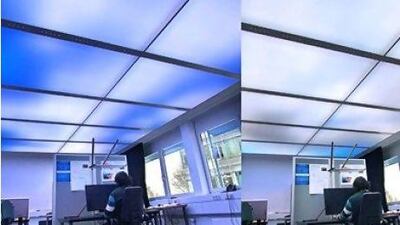Times are getting harder for employees, especially in Europe, where cutbacks and lay-offs prompted by the euro crisis are piling pressure on those with jobs to work longer hours for less pay.
Road to ruin or recovery?
Euro Zone The National charts Europe's struggles as it attempts to through of financial crisis. Learn more
So it's refreshing to hear efforts are being made to take a little of the stress out of work, both in the office and at home.
Researchers in Germany decided to take blue-sky thinking literally and came up with a novel idea to brighten up the workplace.
The Fraunhofer Institute for Industrial Engineering, based in Stuttgart, developed a lighting system that recreates the open sky on office ceilings, complete with passing clouds, to give people the pleasing impression they are outdoors when they are chained to their desks.
Ceiling panels replicate the changing light conditions caused by clouds moving across the sky. They contain light-emitting diodes (LEDs) positioned behind a matt white diffuser film. The LEDs produce a full light spectrum capable of generating more than 16 million hues. The idea is to cover an entire office ceiling with the panels.
They are programmed to simulate outdoor light in a subtle way that does not distract people. The institute said last week 10 volunteers who took part in a preliminary study, carrying out their daily work for four days under the virtual sky, found it to be "extremely pleasant".
The researchers say the system can promote concentration and alertness by conveying a feeling of spaciousness and freedom. It has been developed in cooperation with LEiDs, a company that specialises in lighting technology.
The system will go on show in March at the CeBIT electronics trade fair in Hanover. The institute said it had already been contacted by potential customers. At €1,000 (Dh4,673) per square metre, it won't come cheap, but the price will fall once production increases, says the institute, adding that the system is energy efficient.
Making the working environment more appealing is an age-old strategy to make employees happier and more productive. It has been tried with fish tanks - sometimes filled with piranhas for extra incentive - fruit bowls, cheerfully colourful wallpaper and, in some German firms, ample supplies of bottled beer in the fridge.
But the impact of such measures is limited. For millions of workers, physical surroundings pale into insignificance compared with what they see as the true curse of modern working life: the round-the-clock availability afforded by smartphones with email and internet capability.
Companies have become astoundingly generous in recent years, issuing shiny new phones to their staff. But it would be a mistake to regard the devices as a perk, because the sole aim is to boost productivity through constant communication with employees.
The gadgets make it harder, and often impossible, for people to switch off, as it were, at the end of their working day.
That discreet beep or flashing light on the BlackBerry or iPhone at night can summon you back into work mode in an instant. Ignore it at your peril. There will always be a colleague willing to score points with the boss by answering their messages at any time of the day or night. After all, such keenness - some would opt for less flattering terminology - gets noticed.
Smartphones have become a tool of tyranny. They have brought not only work, but the whole battleground of office politics, into our homes.
So an innovation announced last month by Volkswagen, Europe's largest car maker, should make businesses and trade unions around the world sit up and listen.
The company's powerful works council pushed through a ban on the transmission of work emails to employees' smartphones 30 minutes after the end of their shift.
The deal was agreed with the management and applies to some 1,100 employees who have a company-issued smartphone and a standard VW contract. The phones will remain usable for calls, but the VW server won't send emails until 30 minutes before work begins the next day.
Senior VW executives who are on separate management contracts will continue to receive company emails 24 hours a day. But now they won't be able to delegate tiresome tasks by sending a quick after-hours email to their subordinates.
"The new possibilities of communication also pose risks," said Heinz-Joachim Thrust, a member of the VW works council. "We wanted to pre-empt that. The response to this agreement has been very positive."
Psychological studies on workers indicate employee burnout causes almost 10 million sick days a year in Germany.
Some top executives, it seems, are also tired of constantly being reachable. Before Christmas, Kasper Rorsted, the chief executive of Henkel,a German consumer products group, issued a ban on all work emails between Christmas and New Year's Eve, declaring: "I shouldn't have to read emails just because someone somewhere is bored."
It remains to be seen whether the rebellion at VW will catch on. It may in Germany. After all, VW is the country's biggest company in terms of employees - 449,000 worldwide - and notched up sales of €116 billion in the first three quarters of last year, up 26 per cent compared with the same period in 2010. But it's unlikely to become a worldwide trend. The nebulous burnout risks are minor compared with the cost savings and convenience of keeping employees on the smartphone leash.
Besides, German companies can afford to be a little more magnanimous than their European rivals in. They are better placed to weather the debt crisis storm.
Economists are predicting that the economic downturn in Germany caused by the euro debacle will be milder and briefer than in other countries.
twitter: Follow and share our breaking business news. Follow us

